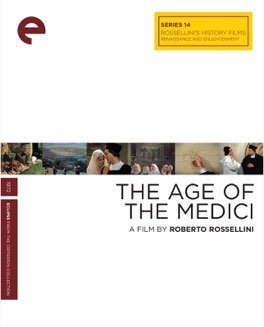ROBERTO ROSSELLINI
The Age of the Medici
I’m a lover of history, real and imagined. I listen to history podcasts, I enjoy historical films, I read non-fiction history books. If it’s a history of something, I’m likely sucked in. I am, therefore, in the perfect target audience for a film like this one. It’s dry. It’s staid. It’s incredibly long. I am not shocked at all that so many people, then and now, have found it unpalatable in the extreme. But I really liked it. I enjoyed every minute, and I could have watched for four and a half hours more. I’m so excited to watch the rest of the films in this set.
This tells the story of the rise of Cosimo de’ Medici, the head of the richest banking family in Europe. We see him starting with the death of his father, and his full takeover of the family business. We watch him navigate around his various political enemies, inside and outside his native city of Florence. We see as he continually attempts to improve his city, as well as his family’s place in the world. Simultaneously, we follow the story of a young curio, Leon Batista Alberti, who becomes a true Renaissance man. Alberti is a writer, a mathematician, a theorist, an artist, and an architect. Through Alberti we get the full picture of the message Rossellini was attempting to convey.
That message is one that strikes a chord with me. The idea, as espoused by Alberti, is that in order to be an artist you have to learn about all the other subjects as well. If your goal is to hold a mirror up to the world, you have to understand Biology, History, and Geometry. It’s a point that rings perhaps even truer today. We focus ourselves so completely in whatever area our income derives from, and tend to learn about that chosen subject at the expense of all others. But life isn’t a microscope. In focusing so completely we lose the advantage of synthesizing other knowledge into our own. We lose the ability to take the best of everything and create something new.
When studying mathematics, students have to decide if they want to go into one of two main branches, pure mathematics or applied mathematics. The difference between the two is right in the names, applied math is anything we have a use for, pure math is anything we don’t have a use for yet. The problem, is that math doesn’t go from pure to applied until someone figures out something to use it for. But how can that ever happen, if pure mathematicians aren’t looking for uses, and if everyone else is ignoring pure math completely? There is so much knowledge being generated in the world today. More than anyone could ever hope to learn. Still, we should at least keep our minds open to everything, and try to gain a broadness of knowledge, in addition to a depth.
